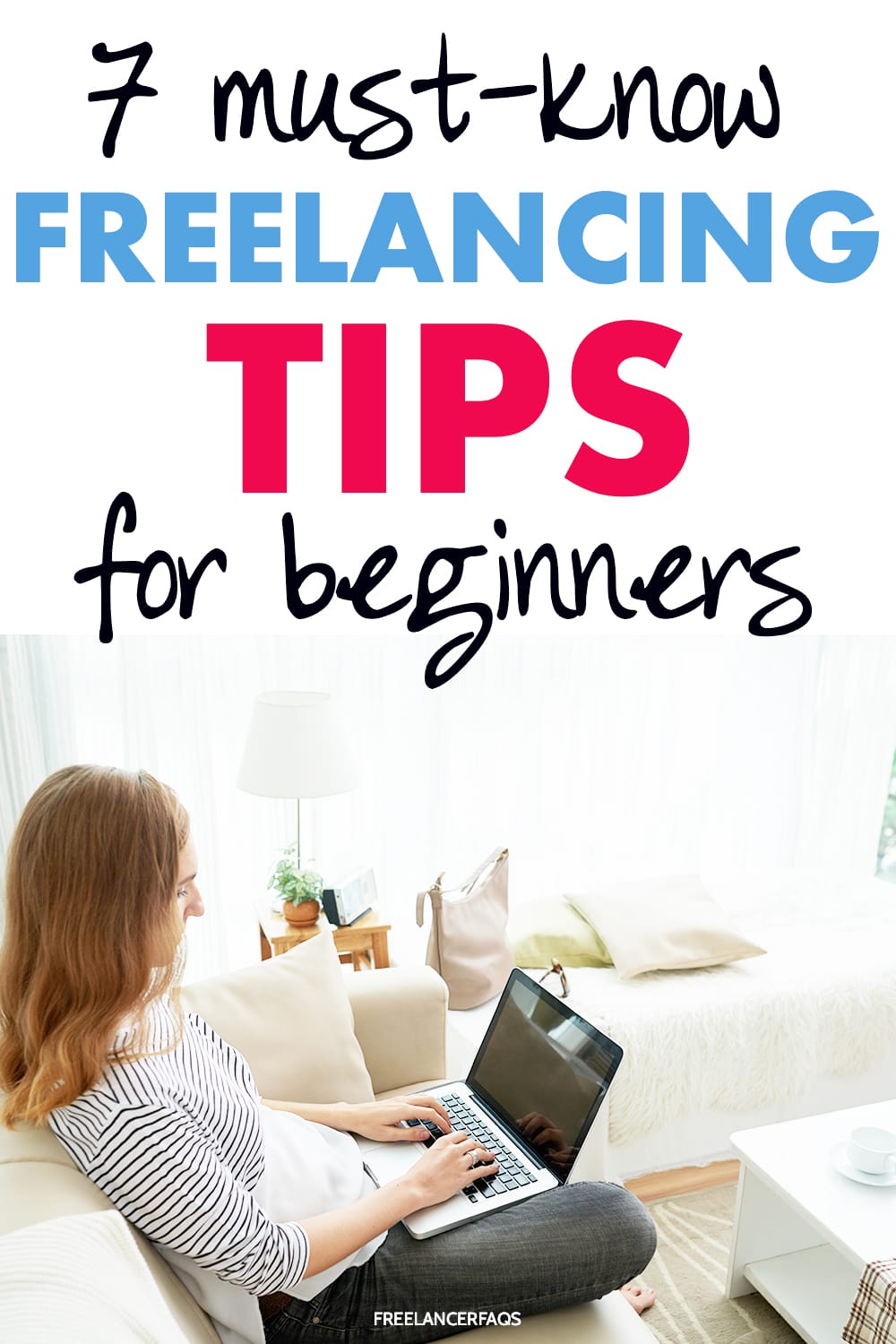You’ve been thinking about freelancing for a while.
The luxury of working from your couch. Not having to navigate the rattlesnake of New York City traffic. On a schedule that works for you. Because you’re not a morning person. At all.

You know you’re good at what you do, but you don’t know the first thing about freelancing.
But where do you even get started and what freelancing tips do you need to know?
You know you’re good at what you do, but you don’t know the first thing about freelancing. And, in this economy, is it even the right time?
A few months ago, I was like you.
People were always asking me to write things for them. But I didn’t know anything about working for myself. The WHO had just declared a pandemic. And economy was getting sea-sick.
A new year and several happy clients later, I’m sharing with you some of the most critical freelancing tips for beginners.
7 Freelancing Tips for the Absolute Beginner
1. Always Track Your Time (Even if You Don’t have to)

But you do flat rates you say? Track it anyway. When you’re new to the freelancing game, you might think: “Sweet! I got $30 for a dog behavior article!”
But then you realize it took an hour to interview the person, 1 hour of research, and about 3 hours for editing and revisions. And then it sinks in that you made a whopping $6 an hour.
Time is money, especially in freelancing. The best freelancing tip I can give is: whether you’re writing or a virtual assistant, how you spend every minute (be it pitching or doing an assignment) affects your income.
And you don’t need to buy software if that’s not an option for you. You can track your hours simply by using your phone’s timer. And then log it in Google Sheets.
This way, you can figure out how much your hourly rate is, and where your time is going. Which can come in handy when you’re growing your freelance business.
2. Be Specific
“What does this person do?” If that’s the first thing someone asks when they get to your LinkedIn or freelance portfolio, you’re off to a rough start.
The good news? It’s fixable.
I cringe when I see freelancers that put vague headlines like “freelancer,” “freelance writer,” or simply “open to new opportunities.” Because vagueness is the enemy of good copy.
And maybe you’re thinking, “Well lady, I don’t want to touch copywriting with a ten-foot pole. So there.”
Fine. But it is on you to promote your fabulousness, and vagueness just…doesn’t.
The internet is flooded with freelancers/freelance assistants/writers.
Being vague (or listing 10 different jobs you’d like to do), doesn’t help you stand out. Even worse? It can convey the subtle message you don’t know what you’re doing. And that’s bad for business.
Choose a specific industry or field you’d like to work in.
Maybe it’s legal writing. Or you want to be a technical writer for startups. But pick something. And write your new copy with the person seeking that service in mind. Tailor it to them specifically.
And it’s okay if 6 months from now you discover you hate copywriting and want to be a curriculum writer. Your business can evolve. It’s allowed. But for now, pick something that speaks to you and your abilities in this moment.
Remember, people scroll through search results fast on the internet. Make sure vague copy isn’t the reason they scroll by.
3. Always Follow Up
As a green bean, you don’t usually have people coming to you. You need to cold pitch. A lot. On job boards, through emails, or sometimes, the phone. To total strangers.
I don’t say this to scare you, but it’s important to be aware of this key aspect of freelancing before you dive in. If you’re timid, or worried about bothering people, it’s going to be hard.
But if you pitched for an assignment, (politely) follow up. Email that Pinterest Marketing blogger to see if they’re open to having someone guest post. If a client hasn’t paid within the agreed time-window, send a polite reminder. They key word here is polite, you need to be diplomatic. Always.
I actually got my first big gig by following up. I sent a follow up email on a project I’d been discussing with a potential client and the person offered me the assignment!
4. Raise Your Rates
Once, I copy edited a home page for $87 (fun!).
Most new freelancers, from what I’ve seen, underprice their services. See Exhibit A above. Or the number of freelancers who ask if “20/hr or insert incredibly low rate here” is too much.
Remember, freelancing is different from working fulltime for a company.
You’re responsible for paying a self-employment tax and your health insurance premiums. And you have life things, too. Rent, groceries, childcare. All of that needs to be taken into consideration when you’re figuring out your rate.

5. Prioritize Work-Life Balance
Confession: I’ve struggled with workaholism most of my life. And it took a toll on my health. One of my biggest business goals is to focus on balance. So, it might sound strange that I went the freelancing route.
Freelancing can definitely fuel your workaholism if you’re not careful. There’s always gigs, pitches, and follow up emails to be done. Clients who email you late at night. Or want infinite re-writes.
I can’t stress enough how important it is to maintain healthy work-life boundaries and take care of yourself.
This means setting alarms or reminders to take lunch breaks (and don’t work during lunch). Staying hydrated. Doing some form of exercise. And “clocking out.” That means putting the laptop away and spending time with your family, eating a proper dinner, and getting enough sleep.
6. Get on Social Media
Social media is a necessary part of life as a freelancer. Did you know that if Facebooks was a country, it’d be the largest in the world? That’s a lot of people you could be connecting with. If you’re not on social networking sites, you’re already behind.
Plus, it’s free marketing for a newbie on a shoestring budget (okay, even if you’re rolling in dough, you still need it-get on there). Social Media sites are a great way to put yourself out there and connect with clients looking for exactly what you have to offer.
That being said, you don’t need to be on all the platforms everywhere. It’s okay if you just want to invest in building up your Facebook and Twitter. As a one-person show, don’t stretch yourself too thin.
Go where your audience is. Because they may not be on certain channels.
For example, if you’re on TikTok, that’s probably not the best way to reach high-level executives. Do your research to find out what platforms your ideal clients use.
7. Find Your Squad
Find your fellow X-Men!
Freelancing can seem like a lonely experience, but it doesn’t have to be. A good freelancing tip to follow is to connect with other professionals in your industry. Reach out to other writers/TEFL teachers/insert your service here.
These are people who know what you’re going through. And are willing to give you pointers on what to do if your client sends you a series of angry tweets or give feedback on your pitches.
And you can be part of their squad, too.
Freelancing Tips for Beginners
When you first start freelancing, there’s naturally going to be a learning curve. And you will make mistakes. It’s part of how you grow. But by avoiding these common snafus, your first few months will get off to a much smoother start.



2 Comments